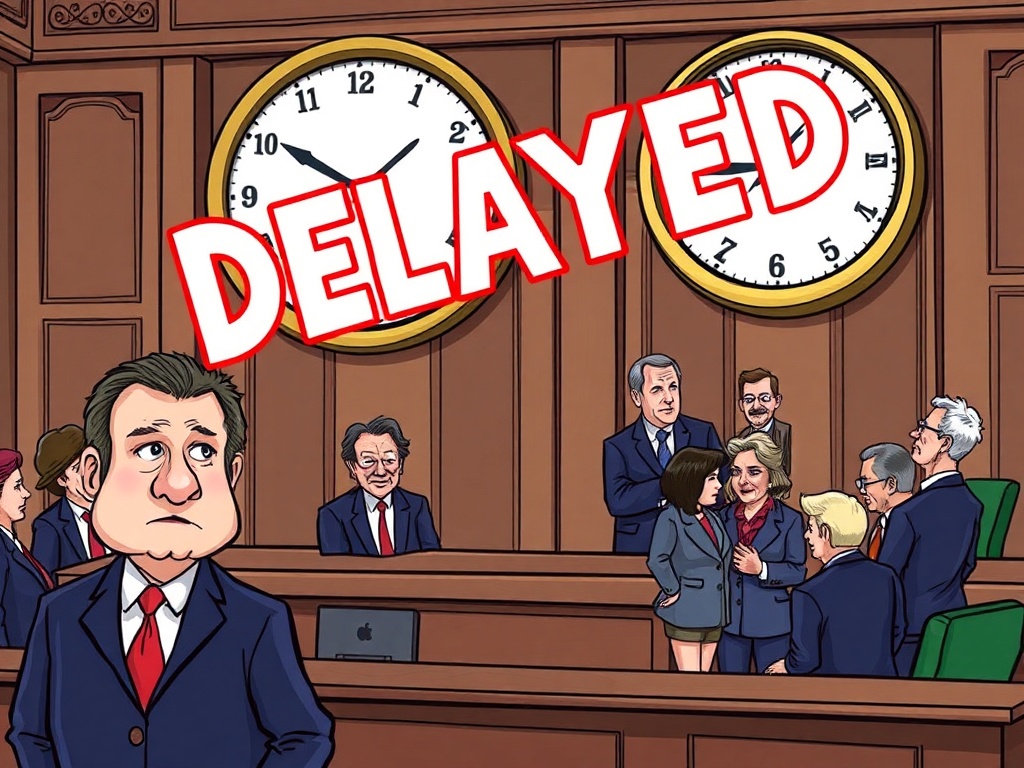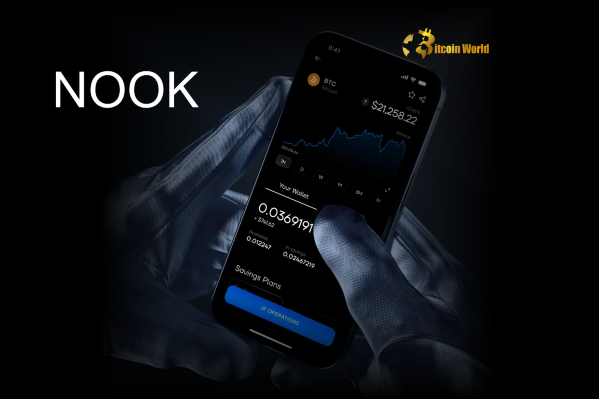BitcoinWorld

CFTC Nomination Delay: Unraveling the Crucial Setbacks for Brian Quintenz
In the dynamic and often unpredictable world of cryptocurrency, regulatory appointments can send ripples across the entire market. One such development that has recently captured significant attention is the ongoing CFTC nomination delay concerning Brian Quintenz. What exactly does this mean for the future of digital assets, and why are these procedural hurdles proving so persistent? Let’s delve into the latest update and unpack its potential implications.
Understanding the CFTC Nomination Delay: What Happened This Time?
The cryptocurrency community, always keenly observing regulatory shifts, received news of yet another postponement in the vote to advance Brian Quintenz’s nomination as Chairman of the Commodity Futures Trading Commission (CFTC). This latest setback was reported by Eleanor Terrett, host of Crypto in America, via X, highlighting a recurring pattern of delays for this pivotal appointment.
While the specific reason for this most recent postponement remains shrouded in ambiguity, it echoes a similar incident from the previous week, which was attributed to a Republican senator’s travel complications. Such procedural delays, though seemingly minor, can have significant ramifications for the operational efficiency and strategic direction of a key financial regulatory body like the CFTC.
To grasp the weight of this development, consider the typical legislative process:
- Nomination: The President nominates an individual for a position.
- Committee Review: The relevant Senate committee (in this case, the Senate Agriculture Committee) reviews the nominee’s qualifications and conducts hearings.
- Committee Vote: The committee votes on whether to recommend the nominee to the full Senate.
- Full Senate Vote: If approved by the committee, the nomination moves to the full Senate for a final confirmation vote.
The repeated halt at the committee vote stage for the CFTC nomination delay signifies a deeper issue, whether it’s scheduling conflicts, political maneuvering, or unresolved policy debates behind the scenes.
Who is Brian Quintenz and Why Does His CFTC Nomination Delay Matter?
Brian Quintenz is a name well-known within regulatory circles, particularly for his prior tenure as a Commissioner at the CFTC from 2017 to 2021. During his previous term, Quintenz established himself as a prominent voice on cryptocurrency regulation, often advocating for a balanced approach that encourages innovation while mitigating risks. His insights and perspectives have been crucial in shaping the CFTC’s stance on digital assets.
The CFTC itself plays a vital role in the U.S. financial landscape. It is an independent agency that regulates the U.S. derivatives markets, including futures, options, and swaps. Increasingly, its jurisdiction has extended into the burgeoning crypto market, particularly concerning derivatives products tied to digital assets.
Here’s why his potential chairmanship and the ongoing CFTC nomination delay are so significant:
| Aspect | Significance for Quintenz’s Chairmanship | Impact of Delay |
|---|---|---|
| Regulatory Clarity | A confirmed Chair can provide clear direction on crypto policy, reducing market uncertainty. | Prolongs ambiguity, making it difficult for businesses to plan and innovate. |
| Enforcement Actions | A strong Chair can guide the CFTC’s enforcement priorities against illicit activities. | May slow down critical enforcement, potentially allowing bad actors to operate longer. |
| International Collaboration | A confirmed leader can effectively represent the U.S. in global regulatory discussions. | Hinders coordinated international efforts on emerging financial technologies. |
| Market Innovation | A Chair with a nuanced understanding of crypto can foster responsible innovation. | Stifles progress as firms await regulatory frameworks to proceed with new products. |
Quintenz’s past remarks and actions suggest he favors classifying most cryptocurrencies as commodities, placing them under the CFTC’s purview rather than the Securities and Exchange Commission’s (SEC). This distinction is incredibly important for crypto firms, as it determines which regulatory framework they must adhere to, impacting everything from fundraising to trading operations. His confirmation could therefore set a definitive tone for how digital assets are regulated in the U.S.
Implications of the CFTC Nomination Delay for Crypto Regulation
The prolonged absence of a confirmed Chairman or the continued uncertainty surrounding key appointments at the CFTC can create a leadership vacuum. This vacuum can slow down the development and implementation of new regulations, impacting the crypto market in several ways:
- Regulatory Uncertainty Persists: Without a clear leader, the CFTC might be hesitant to issue new guidance or take decisive stances on complex crypto issues, leaving market participants in limbo.
- Innovation Hurdles: Companies looking to launch new crypto products or services might face delays or increased caution due to the lack of clear regulatory signals.
- Competitive Disadvantage: The U.S. risks falling behind other nations that are more swiftly establishing comprehensive regulatory frameworks for digital assets.
- Investor Protection Concerns: While the CFTC continues its work, a fully staffed and led commission can more effectively address emerging threats and protect investors from fraudulent schemes in the rapidly evolving crypto space.
The delay in the CFTC nomination delay means that critical decisions regarding the classification of digital assets, the oversight of crypto exchanges, and the approach to decentralized finance (DeFi) might be postponed or proceed with less unified direction. This affects not just large institutions but also individual investors and developers who rely on a predictable regulatory environment.
Navigating the Senate’s Confirmation Process: Challenges and Hurdles for the CFTC Nomination Delay
The U.S. Senate’s confirmation process is notoriously complex and can be fraught with political challenges. Nominations, especially for influential positions like the CFTC Chair, can become bargaining chips in broader legislative battles or fall victim to partisan gridlock. Several factors could contribute to the ongoing CFTC nomination delay:
- Political Dynamics: In a closely divided Senate, every vote counts. Nominations can be delayed if a party wants to exert leverage on other legislative priorities.
- Scheduling Conflicts: The Senate’s calendar is often packed, and committee votes can be rescheduled due to various reasons, including senator travel or conflicting hearings.
- Policy Disagreements: While Quintenz is generally seen as a moderate voice on crypto, there might be senators who disagree with his specific regulatory philosophy or want to see a different approach to digital assets.
- Opposition Tactics: Even without outright opposition, a single senator can sometimes hold up a nomination for various reasons, including to draw attention to unrelated issues.
These delays, while frustrating, are a part of the checks and balances inherent in the American political system. However, for a rapidly evolving sector like cryptocurrency, prolonged uncertainty can be particularly detrimental, hindering growth and investment.
What’s Next for the CFTC Nomination Delay?
As of now, the path forward for Brian Quintenz’s nomination remains unclear. The Senate Agriculture Committee will eventually need to reschedule the vote, but the timing and the potential for further delays are unpredictable. The crypto community will undoubtedly continue to watch closely, as the confirmation of a CFTC Chair with a clear vision for digital asset regulation is paramount for the industry’s continued maturation and integration into the broader financial system.
The ongoing saga of the CFTC nomination delay underscores the intricate relationship between political processes and the rapidly evolving financial landscape. While the reasons for the postponements might seem procedural, their impact on regulatory clarity and market stability for cryptocurrencies is profound. The industry eagerly awaits a resolution, hoping for a definitive direction that can foster both innovation and robust consumer protection.
Frequently Asked Questions (FAQs)
1. What is the CFTC?
The Commodity Futures Trading Commission (CFTC) is an independent agency of the U.S. government that regulates the U.S. derivatives markets, including futures, options, and swaps. Its mission is to foster open, transparent, competitive, and financially sound markets and to protect market users and the public from fraud, manipulation, and abusive practices.
2. Why is the CFTC important for cryptocurrency?
The CFTC plays a crucial role in cryptocurrency regulation because it generally views many digital assets, particularly those not classified as securities, as commodities. This gives the CFTC jurisdiction over crypto derivatives products and certain aspects of spot crypto markets, aiming to prevent manipulation and ensure fair trading practices.
3. Who is Brian Quintenz and what is his background with crypto?
Brian Quintenz previously served as a Commissioner at the CFTC from 2017 to 2021. During his tenure, he was a vocal advocate for clear and sensible cryptocurrency regulation, often emphasizing the importance of innovation. He is known for his perspective that many cryptocurrencies should be regulated as commodities.
4. What are the potential impacts of a prolonged CFTC nomination delay on the crypto market?
A prolonged CFTC nomination delay can lead to increased regulatory uncertainty, potentially slowing down innovation in the U.S. crypto sector. It might also delay the implementation of new guidelines, affect enforcement actions, and hinder the U.S.’s ability to lead in international crypto regulatory discussions.
5. What is the role of the Senate Agriculture Committee in this nomination?
The Senate Agriculture, Nutrition, and Forestry Committee is responsible for reviewing and voting on nominations for positions within the CFTC, as the agency oversees commodity markets. If the committee approves a nominee, it then recommends them to the full Senate for a final confirmation vote.
Did you find this article insightful? Share it with your network on social media to keep others informed about the critical developments impacting crypto regulation!
To learn more about the latest crypto market trends, explore our article on key developments shaping Bitcoin institutional adoption.
This post CFTC Nomination Delay: Unraveling the Crucial Setbacks for Brian Quintenz first appeared on BitcoinWorld and is written by Editorial Team





